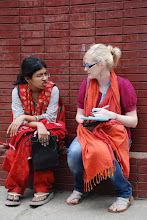The field trip – to Rajshahi and Rangpur – was exactly the sort of Bangladeshi send off I’d hoped for. The trip invariably included a wealth of culture, amazing people, incredible work and hilarious Bangladeshi moments. The highlight? Hanging out with a midget named Taj Mahal.
I met Taj Mahal through UNICEF’s Adolescent Empowerment project. Through this project, which has proven so successful it is an example of best practice across South Asia, we educate adolescents across the country about their rights (dowry, early marriage, trafficking, child labour, birth registration, HIV/AIDS, etc) so that they then become advocates within their own communities. Through the project 30 adolescents from three regions were selected to participate in a photography training course and thematic exhibition competition. Through Pathshala (Drik Gallery’s photography training arm) the adolescents received training on how to use the digital cameras that UNICEF provided. Besides the technical training they’ve learnt how to take a good photo, considering lighting, framing, composition, etc. Based on the training each adolescent has chosen a theme that impacts their life (child labour, trafficking, disability, etc) and these photos will be submitted for exhibition in Dhaka and around the country.
Farida is one such adolescent I met in Rajshahi. Farida’s father and two sisters are “specially-abled” (dwarves/midgets – sorry, I’m unclear on the politically correct term here). Farida and her mother are “normal”. Although Farida’s father and sisters work (and damn hard) they still suffer prejudice.
In Bangladesh disability is shunned – if you can’t work and contribute to the survival of your family, you are socially excluded. Farida hopes that her photos will help raise awareness and acceptance of people with disabilities in Bangladesh. So we spent a few hours with Farida and Taj in their home, observing Farida taking photographs of Taj as she spends her days – working as a tailor.

Taj at her sewing machine.
Prior to that we’d been across the road from Shuktara’s house where her young neighbours work at a cement business. When there is a contract, the boys (as young as 8) work long hours in midday heat for between 90 and 120taka a day (the younger the boy, the less he is paid) – that’s less than $2 USD.

We also went to Mahfuz’s house to observe him taking photos of a boy who was trafficked to India, but somehow - miraculously - made it home. The boy heard we were coming and hid – clearly untrusting of foreigners with grand intentions.
In between work Topu (the photographer) and I hung out at a great little tea stall chatting to locals, seeing the city by rickshaw, visiting the silk mills famous in that part of the country and watching the sun set over the Padma River (the Ganges where it ends in India). Rajshahi is a town to fall in love with (not in the same sense as Marrakech or London, but on a Bangladeshi scale...), and I did.

Watching the sun set over the Padma.
From there we drove the bumpy road to Rangpur to interview women part of a Mothers Support Group and a UNICEF/Government of Bangladesh project that has seen incredible results in the district - fast approaching MDG goals and breaking down social taboos and gender disparities. It’s a beautiful and inspiring thing.
I have often wondered this year how the naked baby/ toilet thing works. Well, now I know. And, in my opinion, not very well. After the interviews we were photographing Marina, her husband, mother-in-law and baby Munaf. Everyone is posed, straight-faced of course, for the camera. Munaf, content in his mother’s arms, pees. We all laugh, but the family stay put for the photos. And I can’t help but wonder what happens now? In this heat that pee is going to dry quickly. Presumably Marina doesn’t change her sari every time Munaf pees on her. She’d spend the entire day doing washing. This whole scenario disturbs me and I’ve only witnessed a Number 1...
I met a guy at a party last night who works for an INGO here in Dhaka and who is very sceptical of the work undertaken by the UN. I was one of only two UN employees in the room. We were grossly outnumbered but we passionately took up the fight. But the debate is endless. The UN is a massive bureaucratic machine. There is a lot of money to be made in development – UN and NGO alike. But I’ve just returned from a field trip – one of many that has only further reinforced to me the importance of the UN’s place here in Bangladesh.
There are many examples of UN inaction, corruption and impropriety, so there is no denying that improvement is essential. But for all the work that is yet to be done, I know we are improving the lives of men, women and children. I know because I’ve seen it. And I’m proud and grateful to have had this opportunity – I’ve learnt so much, grown as a person, and have found a new meaning and direction in my career. I am inspired to give a voice to those who are silent.

No comments:
Post a Comment